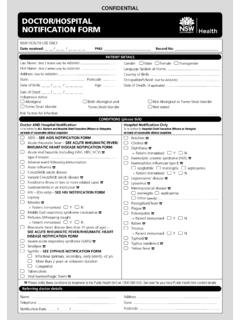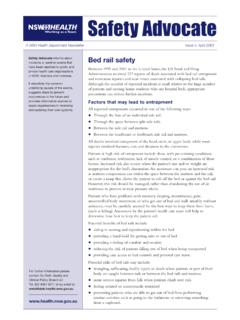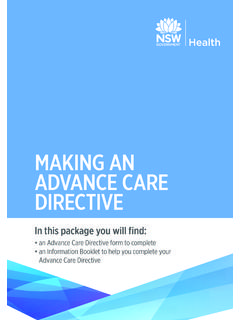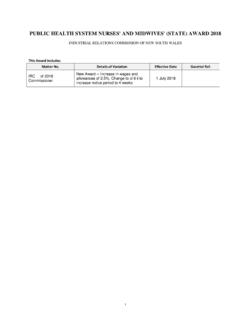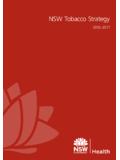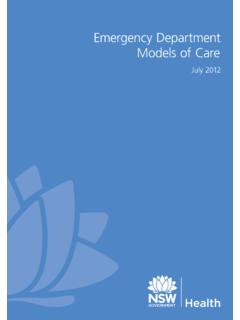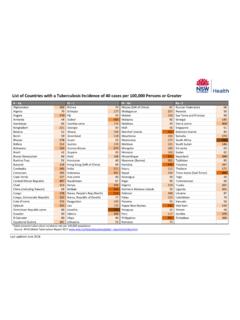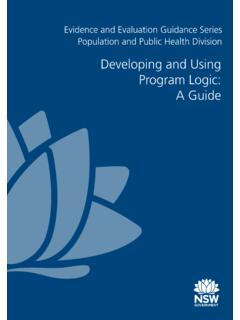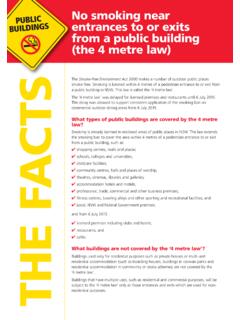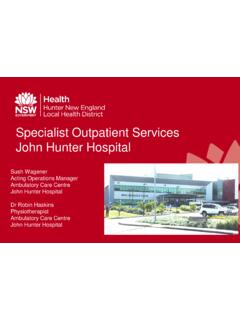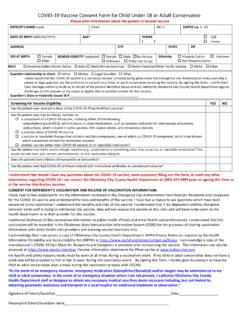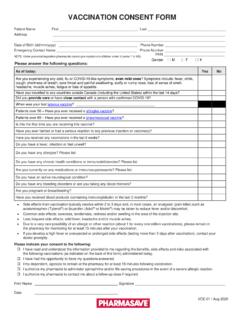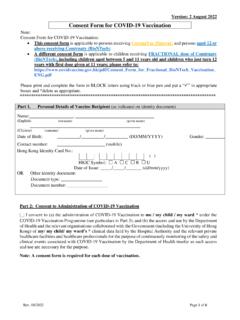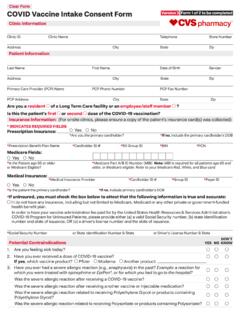Transcription of NSW School Vaccination Program Year 7
1 NSW School Vaccination ProgramYe a r 7 IMPORTANT INFORMATION 2022 November 2021 NSW Health. SHPN (HPNSW) 210756 Translations in 26 languagesVisit School Vaccination ProgramNSW Health works with schools to offer human papillomavirus (HPV) and diphtheria-tetanus-pertussis (dTpa) vaccines to Year 7 students in a School -based Vaccination Program . These vaccines are recommended by the National Health & Medical Research Council (NHMRC) and funded under the National Immunisation Program . Information about the vaccines and thediseases they protect against are includedin this Parent Information Sheet. For your child to be vaccinated, consentfor each vaccine must be provided bythe parent/guardian on the enclosedConsent form . The vaccines are onlyprovided free at School if you complete,sign and return the consent form whileyour child is in Year 7. consent can be withdrawn at any timeby following the advice on page 2.
2 If you do NOT wish your child to bevaccinated against a disease, do NOTsign your name next to that vaccine. A Privacy Statement that explains howthe information you provide is collectedand used is also included on page Health Parent Information Sheet For more information, please contact your local public health unit on 1300 066 055 or visit asked questionsQ. How do vaccines work?Vaccines work by triggering the immune system to fight certain infections. If a vaccinated person comes into contact with these infections, their immune system is able to respond more effectively, preventing the disease developing or greatly reducing its How safe are vaccines?Vaccines used in Australia are safe and must pass strict safety testing before being approved by the Therapeutic Goods Administration (TGA). In addition, the TGA monitors the safety of vaccines once they are in What are the side effects of Vaccination ?Side effects are commonly mild and usually involve pain, swelling and redness at the injection site.
3 Serious side effects are extremely rare. NSW parents who were followed up in the days after HPV Vaccination reported that 9% of students experienced mild side effects while only required medical attention. More information about side effects is available in the Consumer Medical Information (CMI) for the vaccine available from Parents concerned about side effects after Vaccination should contact their GP who should also make a report to the local public health What is anaphylaxis?Anaphylaxis is a severe allergic reaction that may result in unconsciousness and death if not treated quickly. It occurs very rarely after any Vaccination . The School immunisation nurses are fully trained in the treatment of anaphylaxis. Any history of anaphylaxis may mean that a student should not receive a certain What if my child has asthma and takes cortisone or prednisone by a puffer ?The vaccines can be safely administered to someone who has asthma regardless of which medications they are Should the vaccine be given to a female student who is or thinks she may be pregnant?
4 No. Any female student who is, or thinks she may be, pregnant should not be vaccinated. On the day of the clinic the Vaccination nurse will ask female students if they are or could be pregnant. If a student answers yes to this question, she will not be student will be urged to immediately discuss the issue with her parent/guardian and to seek medical help. She will also be provided with contact details for a health referral service that will provide advice, support and Can I withdraw consent ? consent can be withdrawn at any time by providing the School with written notification of the withdrawal of consent or telephoning the School to withdraw What if I prefer to wait until my child is older?These vaccines can only be provided at School by you returning the original consent form while your child is in Year 7. If you choose to wait until your child is older you will need to make arrangements with your GP and there may be costs What if my child missed out on the vaccine at School ?
5 Every effort will be made to vaccinate your child at subsequent School clinics during the Year 7 School year. Where this is not possible, you will be advised of arrangements for catch-up Vaccination . Q. How can I access a record of the vaccinations ?Information about your child s vaccinations will be uploaded to the Australian Immunisation Register (AIR) so it can be linked to your child s existing immunisation can request a copy of their child s AIR Immunisation History Statement at any time up to their child being 14 years of age, and students aged 14 years and over can request their own immunisation history statement, as follows: using the Medicare online account through myGov using the Medicare Express Plus App calling the AIR General Enquiries Line on 1800 653 students receiving HPV vaccine by signing the consent form , you are agreeing to disclose your child s health information for linkage to the National Cervical Screening Program Register in the Where can I find more information about School Vaccination ?
6 More information is available: by visiting the NSW Health website at by contacting your local public health unit on 1300 066 055 NSW Health Year 7 vaccinations Parent Information Sheet Page 2 Information about each of the vaccinesHuman Papillomavirus (HPV)Diphtheria-Tetanus-Pertussis (dTpa)What is the disease and how is it spread?Human papillomavirus (HPV) is a common virus affecting both men and women. HPV is spread through genital contact during sex with someone who has the virus. The virus passes through tiny breaks in the skin and is not spread through blood or other body fluids. Condoms offer limited protection, as they do not cover all of the genital sexually active people will have a genital HPV infection at some time in their lives. While the body usually clears the infection naturally and there are no symptoms, it can sometimes cause serious illness, including: almost all cases of cervical cancer 90% of anal cancers 65% of vaginal cancers 60% of oropharyngeal cancers (cancers of the back of the throat) 50% of vulva cancers 35% of penile cancers almost all cases of genital wartsVaccinating males will prevent cancers and genital warts and will also help to protect females from cervical is a contagious and potentially life- threatening bacterial infection that causes severe breathing difficulties, heart failure and nerve damage.
7 People can get diphtheria by breathing in the bacteria after an infected person has coughed or sneezed, or from close contact with discharges from an infected person s mouth, nose, throat or is a severe, often fatal disease of the nervous system. The person suffers severe painful muscle spasms, convulsions and lockjaw. Even with modern intensive care about 1 in 10 people will die. Tetanus is caused by bacteria found in soil and infection may occur after major injuries or minor injuries (sometimes unnoticed punctures to the skin that are contaminated with soil, dust or manure).Pertussis (whooping cough) is a highly infectious bacterial disease that causes bouts of coughing. Adolescents and adults can have an annoying cough for up to 3 months. Severe bouts of coughing can cause vomiting, rib fractures, rupture of small blood vessels and hernias. About 1 in 125 babies aged less than 6 months who catch whooping cough from an infected person die from pneumonia or brain damage.
8 Whooping cough is spread to other people by droplets from coughing or sneezing. Untreated, a person with whooping cough can spread it to other people for up to 3 weeks after the onset of vaccine will be used?An HPV vaccine that protects against 9 types of HPV (6, 11, 16, 18, 31, 33, 45, 52 and 58) will be offered in a 2-dose course at least 6 months apart. The latest international evidence indicates that most* Year 7 students who receive 2 doses of any HPV vaccine at least 6 months apart are fully vaccinated and do not need a third dose. *Students with significantly impaired immune systems are still recommended to have 3-doses of HPV vaccine at their GP, defined as those with primary or secondary immune- deficiencies (B lymphocyte antibody and T lymphocyte complete or partial deficiencies); HIV infection; malignancy; organ transplantation; or significant immunosuppressive therapy (excluding asplenia or hyposplenia).
9 A combination diphtheria-tetanus-whooping cough vaccine (dTpa) will be offered as a single dose to provide protection against diphtheria, tetanus and whooping cough. This booster dose is essential for maintaining immunity into adulthood after the previous diphtheria-tetanus-whooping cough vaccines given in childhood. Children who have previously received a diphtheria-tetanus vaccine (ADT) should receive the dTpa vaccine to also protect them against whooping should be vaccinated?All students in Year 7 should receive 2-doses of HPV vaccine (those with significantly impaired immune systems should arrange to have 3 doses of the vaccine at their GP see above). Regular cervical screening (previously called Pap smears) is still important for vaccinated women, as the HPV vaccine does not protect against all types of HPV that can cause cervical cancer. All women from 25 years of age who have ever been sexually active should have a Cervical Screening Test every 5 years, regardless of their HPV Vaccination students in Year 7 should receive 1 booster dose of dTpa should not be vaccinated?
10 HPV vaccine should not be given to people who: are or may be pregnant have had anaphylaxis following a previous dose of vaccine have a history of anaphylaxis to yeast have had anaphylaxis following any of the vaccine additives (see below)dTpa vaccine should not be given to people who: have had anaphylaxis following a previous dose of vaccine have had anaphylaxis following any of the vaccine components (see below)What additives does the vaccine contain?The vaccine contains additives in very small amounts to either assist the vaccine to work or to act as a preservative. These include yeast, aluminium adjuvant, sodium chloride, L-histidone, polysorbate and sodium vaccine contains aluminium hydroxide and phosphate, traces of formaldehyde, polysorbate 80 and glycline and was exposed to bovine-derived materials during effective is the vaccine?The vaccine protects against high-risk HPV types that cause over 90% of cervical cancers in women and also protects against additional HPV types that cause cancers in men.
